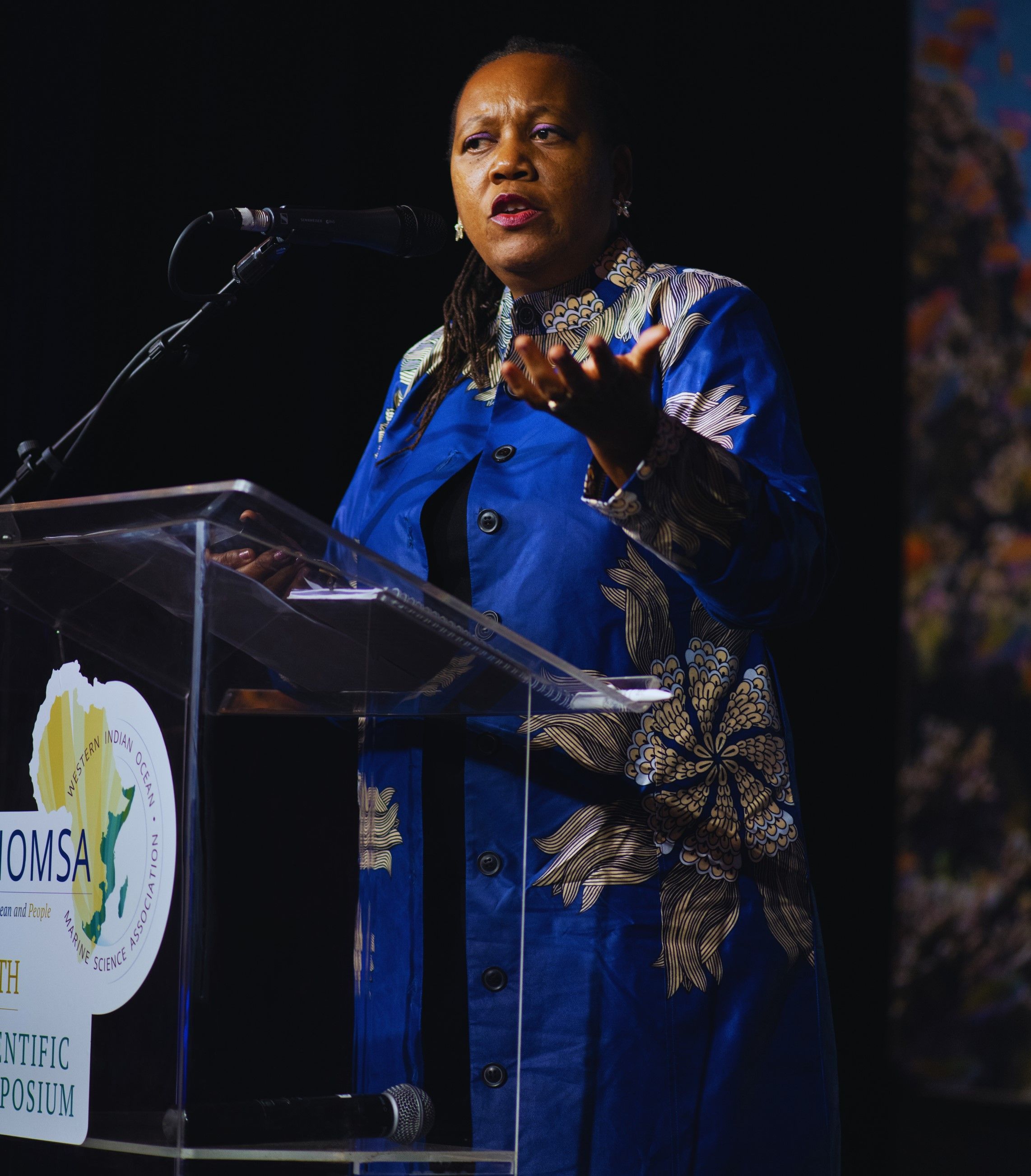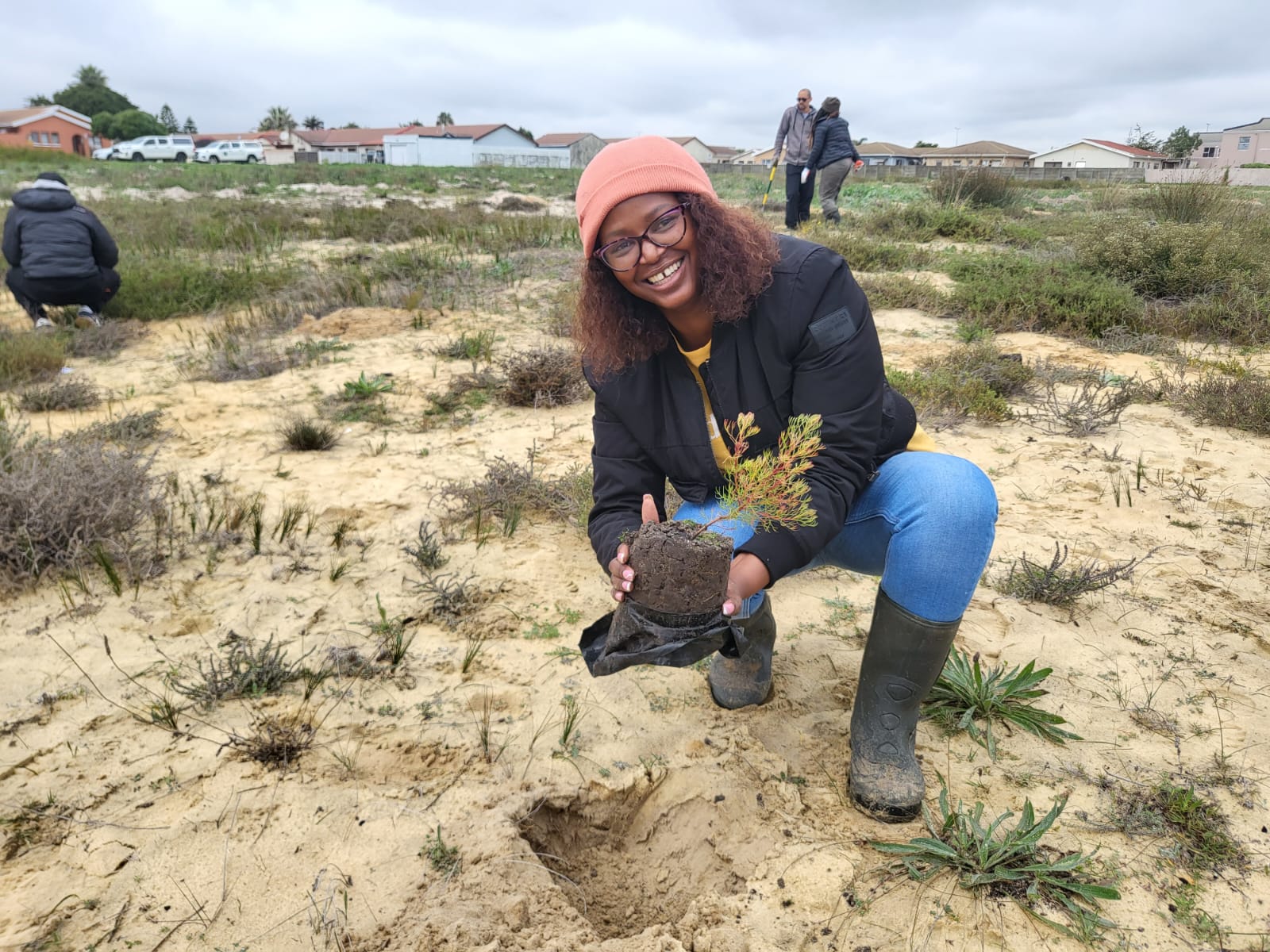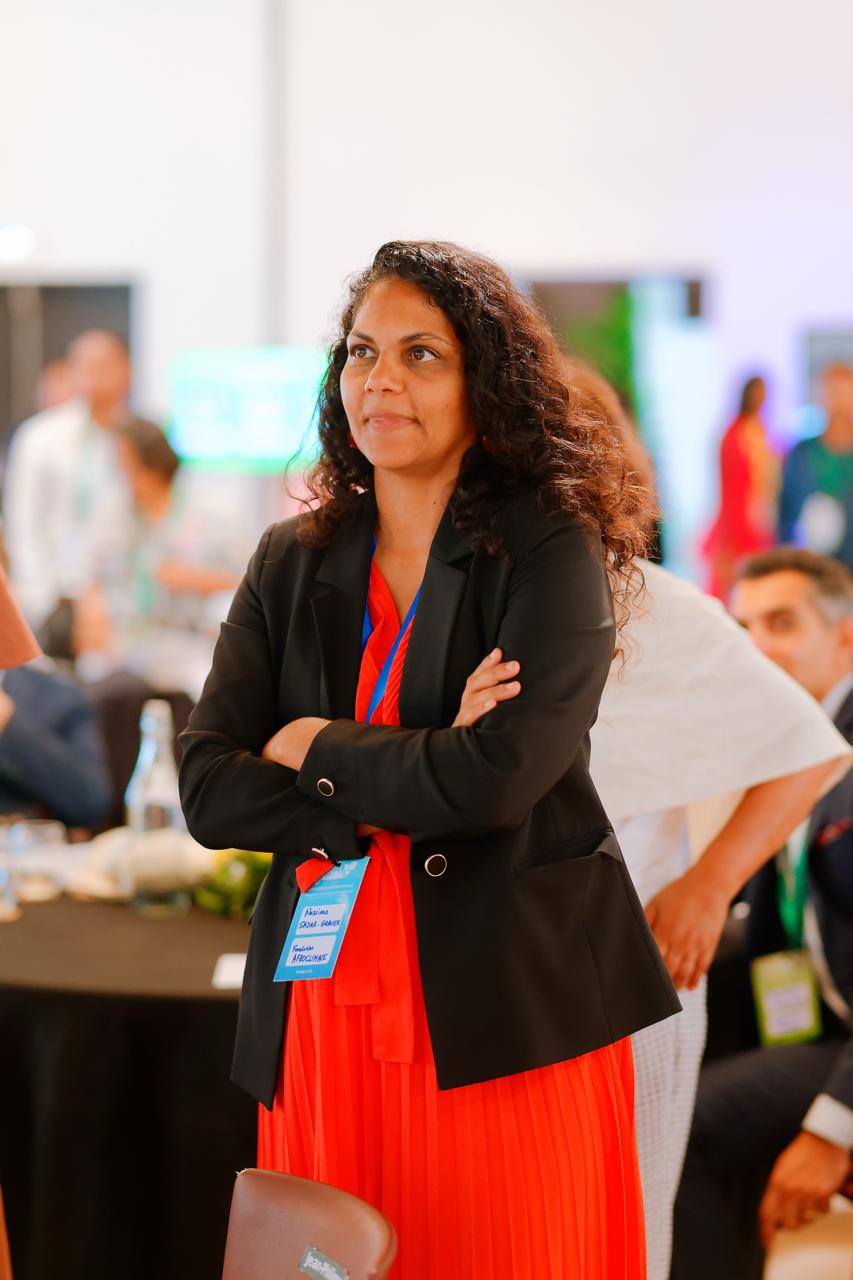This interview is part of a series profiling the stories of the 2024 WE Africa leadership programme fellows, African women in the environmental conservation sector who are showing up with a strong back, soft front, and wild heart.
***
“Who are you?”

This is a question I sometimes lead with in these interviews. It sounds simple, but it’s not easy to answer. Most of us tie who we are to what we do or what we've accomplished. Other times, we try to match how we see ourselves with how we think the world sees us. And those two versions don’t always align—some might say they’re confident when, deep down, they’re constantly questioning their worth. Others might feel invisible, even though their impact on the people around them is undeniable.
Maybe that’s why this question fascinates me so much. It carries the weight of a person’s essence. It’s a challenging question. But not for Jacqueline Uku. She responds without skipping a beat:
“I am a passionate, energetic, courageous, strong and faithful woman leader.”
I ask her to elaborate on the word “faithful”.
"Having faith has kept me from sinking into despair when times were hard,” she says. “I’ve anchored myself in a living God. I pray, study His word, and strive to walk in obedience. I've learned that life doesn’t always come with a clear guide. When Joshua (in the Bible) led the people into the promised land, he had no manual—only the command to be strong and courageous and keep God’s word close. I believe that by relying on God and living in obedience, we can gain clarity, strength and courage in all we do. The principles are simple and rooted in the Ten Commandments—by following them, everything else falls into place.
Indeed, for Jacqueline Uku, everything has fallen into place. She’s not just clear about who she is; she’s equally clear about why she does what she does.
But that clarity didn’t come easily. For years, Jacqueline tried to fit in. Only to realise she was never meant to.
***
Since she was two and a half years old, Jacqueline lived “a nomadic life”. Her father’s work in the Diplomatic Service meant the family was constantly on the move.
While she gained unique perspectives from each country she lived in, Jacqueline longed to put down roots and truly understand her own country. This longing became especially clear during her time in the US, where she struggled to fit in.
When her parents received a new posting to Pakistan, they asked her if she wanted to stay in the US for university. Jacqueline declined. She didn’t want to face life alone.
I don’t need this, she thought. I belong somewhere. Why not figure out where that is—a place where being different won’t be an issue?
Ultimately, she had the choice to live anywhere in the world. She chose to return home.
“When things get tough,” Jacqueline reflects, “I remind myself that this was the space I chose, and I should continually seek its abundance and fruitfulness.”
***
Upon arriving in Kenya, Jacqueline completed high school, enrolled for a Bachelor of Science in Botany and Zoology at the University of Nairobi and was admitted. After completing her degree, she was eager to start working. But her mother offered wise advice: “Take the time to study. It will equip you better. If you choose to work now, someone who has taken the years to study will come along and surpass you.”
Those words stuck with Jacqueline, and she made a decision. She would continue her education up to the PhD level. Her studies eventually led her to the coast of Kenya, where she chose to focus on Marine Science, specifically seagrasses. Finally, in the ocean—among the seagrasses, she found a place she could call home.
Jacqueline married her college sweetheart, and a year later, they had a son. “After years of moving from place to place, I made a deliberate choice to put down roots. I wanted stability, not just for myself, but for my son. I wanted to give him what I didn’t have—the sense of belonging to one place,” she says.
But it hasn’t been easy. Leading projects at work, Jacqueline has sometimes heard the whispers and seen the looks: "Why are we working with someone who doesn’t seem Kenyan?" These sentiments are attributed to the fact that Jacqueline doesn’t have a typical Kenyan accent or surname.
But Jacqueline remains unfazed.
She has come to realise that she doesn’t need to fit into any mould. Instead, she’s learned how to belong—not by changing who she is, but by contributing where she is in ways that are unique to her. One of her key strengths is her ability to embrace people with diverse ideas and opinions.
"I’m able to lead multi-disciplinary teams effectively because I’ve learned to understand and respect diverse perspectives," she explains. “I’ve seen firsthand how bringing together people with different perspectives can create something even greater than what any one of us could achieve alone.”
Jacqueline appreciates that this ability has helped her act as a bridge between different perspectives and agendas and that it is a privilege. “It’s not every day that we have that kind of favour,” she acknowledges. “And what I’ve learned is that faith brings favour, positioning and responsibility.”
The Book of Esther (in the Bible) has been Jacqueline's key source of wisdom. She explains: “Esther had favour, she was positioned, and she had a responsibility; I draw inspiration from this because being nomadic helped me recognise that there are no hindrances or barriers. People can sense this spirit when I meet them. It’s a spirit that embraces everyone.”
***
Jacqueline’s journey into the ocean space happened by accident. “I knew how to swim and liked being in the water,” she reflects. “But then I discovered a whole world under the ocean and thought, hmmm, I can actually build a career out of this.”
In retrospect, Jacqueline recognises she always had an affinity for nature. No matter where she lived, gardening had always been a part of her life. So, while the ocean may have been an unexpected path, it was a natural fit. “Very little research had been done on seagrasses, and this allowed me to explore a space that very few people were occupying.”
Now, a research scientist focusing on seagrasses, Jacqueline is determined to ensure the ocean isn’t an “accident” for the next generation. She’s passionate about helping young people understand the value of oceans and advocates for changes in education and policy.
“Can we begin to include the ocean in our curriculum? Teach it in Geography, History and Economics? Talk about its resources?” she poses.
Aside from her research work, Jacqueline was the immediate past President of the Western Indian Ocean Marine Science Association (WIOMSA) and has been the Chair of the IOC-UNESCO Africa Decade Task Force. She also serves as an IOC-UNESCO Ocean Literacy Expert Group representative, promoting global ocean education and awareness. Additionally, she is one of three lead experts for the High-Level Panel for Oceans and Sustainable Development, where she advises on Kenya's and Africa’s contributions to international ocean policies.
Evidently, Jacqueline is a highly accomplished scientist. But there’s more...
***
“As a child, I always loved reading literature, and now I’ve taken up painting. I want to blend science and art in my career,” she shares.
With this statement, I thought she was just dabbling in art. But then she paused our conversation to show me a resplendent painting of a butterfly she’d done over the weekend. It was impressive.

“I am learning the techniques and will soon apply them to art that reflects the ocean space,” she says with a smile.
Incidentally, creativity has always been a part of Jacqueline’s journey.
“I played the piano for years, even competed in national competitions, but my parents always pushed me to focus on exams,” she recalls. “At the time, alternative careers weren’t really an option—it was all about getting a job and settling down.”
Even now, Jacqueline’s family members have difficulty understanding her career in the ocean. “Someone actually pays me to swim in the ocean, and they’re still not sure how that fits into a traditional job,” she laughs.
During the COVID-19 lockdown, Jacqueline saw the time spent at home as an opportunity. “I thought, why not try something new?” She bought some pastels and started following tutorials on YouTube. Then, she moved on to painting. “It made me happy, so I taught myself and kept at it. Let's see how it goes.”
Essentially, Jacqueline is breathing creativity and vibrancy into a space that often feels too sterile. She brought her creative side into her work by organising a workshop that pulled in artists to tell the story of collaborative research work on Billfish art in coastal spaces in Kenya. The participants explored how to communicate key messages from the paper using art and theatre. This initiative has continued to be an eye-opener to ocean scientists and artists on areas of collaboration in breaking down science into messages that the general public can understand. (Read more about this initiative.)
“Doing this was a significant leap of faith and has opened up a whole new network and way of expression that resonates with society,” she says. Jacqueline continues to integrate elements of art into monthly Science Cafes, held at Alliance Française, which she leads with collaborators in Mombasa.
She recently took on an intern who’s passionate about Swahili, and they’ve worked on translating documents together. The intern also writes poems about the blue economy. Jacqueline sees him thriving in the space as she believes that every talent can grow into a career in the ocean space.
She also mentors young women, including one who is now a science communicator working on a Master's degree using environmental DNA. "I tell her to apply herself but also to communicate science in a way that people can understand," she says.
Aside from incorporating art into her work, Jacqueline is increasingly turning to it as an invaluable outlet for her high-pressure job. "I coordinate research and policy development and now lead the Ocean and Coastal Systems and Blue Economy Directorate as an Acting Director," she explains. "Additionally, I’m leading Kenya’s Marine Spatial Planning process and managing multi-disciplinary teams. This is challenging work and as a woman, I often face the initial reaction of, ‘What can she tell us?’”
“I’ll feel and hear things like, you are not enough for this space, both from myself and from others. But I firmly believe that I am enough and that there’s enough space for all of us. I know where my space is, and I won’t compete with anyone for it. Over time, I have accepted that I move and serve in a way that is uniquely mine. If I can do art for just half an hour every day, it helps me think more clearly and teaches me to be still, for in stillness, one is able to find the answers to complex situations," she says.
Her stillness is certainly not in question. Throughout our conversation, Jacqueline has exuded a calm, grounded presence. She’s entirely at ease with herself, confident in her chosen path.
She continues to enjoy what she does and thrive in her career because, in her words, there are no limits to how far we can go. “Creativity is a gift that we as humans inherited from a God who created this world,” she says. “It’s a gift I try to use each and every day to propel the ocean story forward.”
***
The following statement was written and shared by Dr Jacqueline Uku during her graduation from the WE Africa Leadership Program in December 2024:
What if I shine
I have always been a private person, preferring to lead from the back and afraid to shine.
As I have reflected on the statement, what if I shine in this amazing year of my WE Africa journey, I recall a statement from my father – when things got tough, he would tell me that it was like a night without stars, for he needed the bright ideas to guide him forward.
I recognise that I need to allow myself to step forward and shine, to overcome the barriers that have held me back.
I am beginning to perceive that if I shine, I will become that one shining star that will light up the sky and guide those experiencing dark nights.
Dr Jacqueline Uku, WE Africa 2024 Fellow




